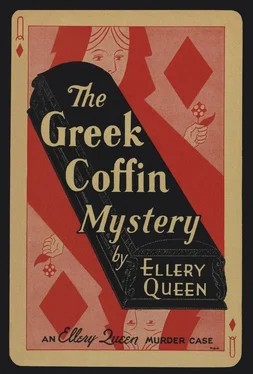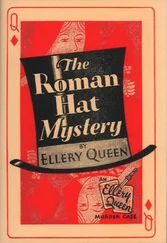“Yet,” he continued rapidly, “the will was not found in the house, on the persons of any one in the house, along the courtyard route, or in the graveyard! I therefore entreat, sue, beg, implore you,” concluded Ellery, his eyes mischievous, “to ask me the enlightening question: What is the only thing which left the house during the funeral, didn’t come back and has never been searched since the will was found to have disappeared?”
Sampson said, “Tommyrot. Everything was searched, and damned thoroughly as you’ve been told. You know that, young man.”
“Why, of course, son,” said the Inspector gently. “Nothing was overlooked — or didn’t you understand that when the facts were related?”
“Oh, my living, breathing soul!” groaned Ellery. “‘None so blind as those that will not see...’” He said softly, “Nothing, my honorable ancestor, nothing but the coffin itself, with Khalkis’ corpse in it!”
The Inspector blinked at that, Pepper muttered disgustedly in his throat, Cronin guffawed and Sampson smote his forehead a mighty blow. Ellery grinned shamelessly.
Pepper recovered first, and grinned back at him. “That’s smart, Mr. Queen,” he said. “That’s smart.”
Sampson coughed into his handkerchief. “I — well, Q., I take it all back. Go on, young man.”
The Inspector said nothing.
“Well, gentlemen,” drawled Ellery, “it’s gratifying to speak to such an appreciative audience. The argument is arresting. In the excitement of the last-minute preparations for the funeral, it would have been a simple enough matter for the thief to have opened the safe, extracted the small steel box with the will in it and, watching his opportunity in the drawing-room, to have slipped box and will into the coffin beneath the folds of the coffin’s lining, or whatever they call Mr. Khalkis’ cerements.”
“It’s a cinch,” muttered Inspector Queen, “that burying the will with the body would be as effective as destroying it.”
“Precisely, dad. Why destroy the will if by secreting it in the coffin due for immediate burial the thief would achieve the same end? Certainly he had no reason to believe, since Khalkis died a natural death, that the coffin would ever be looked into again this side of the Judgment Day. Ergo — the will is removed from mortal ken as completely as if it had been burnt and its ashes consigned to our sewage system.
“Then there’s a psychological justification for this theory. Woodruff had on his person the only key to the steel box. The thief therefore probably could not open the box in the short five-minute interval before the funeral party left the house. He couldn’t — or wouldn’t — carry the box with the will in it around with him; too bulky, too dangerous. Alors, messieurs, box and will are possibly in Khalkis’ coffin. If this be information, make the most of it.”
Inspector Queen hopped to his tiny feet. “An immediate disinterment seems in order.”
“It looks that way, doesn’t it?” Sampson coughed again and stared at the Inspector. “As Ellery — ahem! — Ellery has pointed out, it is not at all certain that the will is there. Maybe Woodruff was lying. But we’ve got to open that coffin and make sure. What do you think, Pepper?”
“I think,” Pepper smiled, “that Mr. Queen’s brilliant analysis hit the nail right square on the head.”
“All right. Arrange the disinterment for to-morrow morning. No particular reason for doing it to-day any more.”
Pepper looked doubtful. “There may be a hitch, Chief, in getting it. After all this isn’t a disinterment based on suspicion of homicide. How are we going to justify to the judge—?”
“See Bradley. He’s liberal about these things, and I’ll call him later myself. Won’t be any trouble, Pepper. Hop to it.” Sampson reached for his telephone and called the number of the Khalkis residence. “Cohalan... Cohalan, this is Sampson speaking. Instruct every one in the house to be present for a confab to-morrow morning... Yes, you can tell ’em that we’re disinterring the body of Khalkis... Disinterring, you idiot!... Who? All right, let me speak to him.” He burrowed the instrument to his chest and said to the Inspector, “Knox is there — the Knox... Hello! Mr. Knox? This is District Attorney Sampson... Yes, too bad. Very sad... Well, something’s come up and it will be necessary for us to disinter the body... Oh, it must be done, sir... What?... Naturally I’m sorry about that, Mr. Knox... Well, don’t fret yourself about it. We’ll take care of everything;”
He hung up softly and said: “Complicated situation. Knox was named executor in a non-producible will, and if that will isn’t found and we can’t establish identity of the new beneficiary for the Galleries, there won’t be any executor. Khalkis will be considered to have died intestate... Well, he seems keen about it. We’ll have to see that he’s appointed administrator if the will isn’t found in the coffin to-morrow. Knox is busy right now conferring with Woodruff at the house. Preliminary survey of the estate. Says he’ll be there all day. Damned nice of him at that, to take all this interest.”
“Will he attend the disinterment?” asked Ellery. “I’ve always wanted to meet a multi-millionaire.”
“He says not. He’s got to go out of town again early to-morrow morning.”
“Another childhood ambition shattered,” said Ellery sadly.
It was on Friday the eighth of October, then, that Mr. Ellery Queen was first introduced to the actors in the Khalkis tragedy, the scene of operations and, what he considered more interesting at the moment, the “tightness in the air” sensed a few days before by Miss Joan Brett.
They had all congregated in the drawing-room of the Khalkis house Friday morning — a very subdued and apprehensive company; and while they waited for Assistant District Attorney Pepper and Inspector Queen to arrive, Ellery found himself engaged in conversation with a tall, pink-and-white young Englishwoman of charming mold.
“You’re the Miss Brett, I take it?”
“Sir,” she said severely, “you have the advantage of me.” There was a tiny smile behind the potential frost of her very lovely blue eyes.
Ellery grinned. “That’s not literally true, my dear. Don’t you think that if I had the advantage of you my circulatory system would know it?”
“Hmm. And a fresh ’un, too.” She folded her white hands primly in her lap and glanced sidewise at the door, where Woodruff and Sergeant Velie stood talking. “Are you a bobby?”
“The veriest shadow of one. Ellery Queen, scion of the illustrious Inspector Queen.”
“I can’t say you’re a very convincing shadow, Mr. Queen.”
Ellery took in her tallness and straightness and niceness with very masculine eyes. “At any rate,” he said, “that’s one accusation which will never be directed against you.”
“Mr. Queen!” She sat up very straight, smiling. “Are you jolly well casting aspersions on my figure?”
“Shades of Astarte!” murmured Ellery. He examined her body critically, and she blushed. “As a matter of fact, I hadn’t even noticed it.”
They laughed together at that, and she said, “I’m a shade of a different kind, Mr. Queen. I’m really very psychic.”
And that was how Ellery learned, most unexpectedly, about the tightness in the air on the day of the funeral. There was a new tightness, too, as he excused himself and rose a moment later to greet his father and Pepper; for young Alan Cheney was glaring at him with homicidal savagery.
Hard on the heels of Pepper and the Inspector came Detective Flint, towing a tubby little old fellow who was perspiring copiously.
Читать дальше












